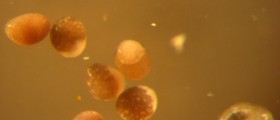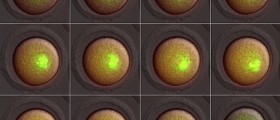
Aside from its unusual laws regarding parental custody, the process of becoming an egg donor in Ohio is otherwise like that in other states of the United States. Women aged 21 to 35 are able to apply at assisted fertility centers to donate their eggs. After review of their written application, each potential donor is then given a physical exam by a doctor (including a test for sexually transmitted diseases), and undergoes interviews with an intake counselor and, usually, a genetic disease counselor. If all the exams go well, the egg donor is accepted into the egg donation program. It may be hours, days, weeks, or months, before the center finds a match, parents wanting to have a child with the donor's personal characteristics.
At this point the prospective donor returns to the center to begin hormone treatments. The first injections of the ovulation stimulant Lupron are taken at the fertility center. Then egg donors give themselves medication at home, until about 34 to 36 hours before egg collection. The egg donor must take a "trigger shot" of a hormone called hCG, and then come back to have her eggs collected. Some clinics require a second test for sexually transmitted diseases immediately prior to egg collection. In the doctor's office, the donor is given a sedative and pain medication. Eggs are collected with a syringe after the fallopian tubes have been identified on ultrasound. The collection needle passes through the wall of the vagina, and one by one eggs are collected into a test tube. The ovaries are washed to make sure that all the "ripe" eggs are collected.
After the procedure, the donor is taken to the recovery room and discharged when fully awake. Most women are able to return to their normal routine the next day. At this point, payment is usually made for the donation of eggs. Ohio law allows egg donors to petition for parental rights, but nothing guarantees that a long, expensive, and emotionally arduous trial will result in the court granting those rights. Fortunately, most egg donors reach satisfactory agreements with the fertility center for anonymous donation and find satisfaction in the knowledge that through egg donation they may have made a new life possible.
- www.cdc.gov/prions/vcjd/vcjd-reported.html
- www.cdc.gov/mmwr/preview/mmwrhtml/su6101a1.htm
- Photo courtesy of Andreas Faessier by Wikimedia Commons: en.wikipedia.org/wiki/Ohio#/media/File:Ohio_schild.jpg

















Your thoughts on this
Loading...